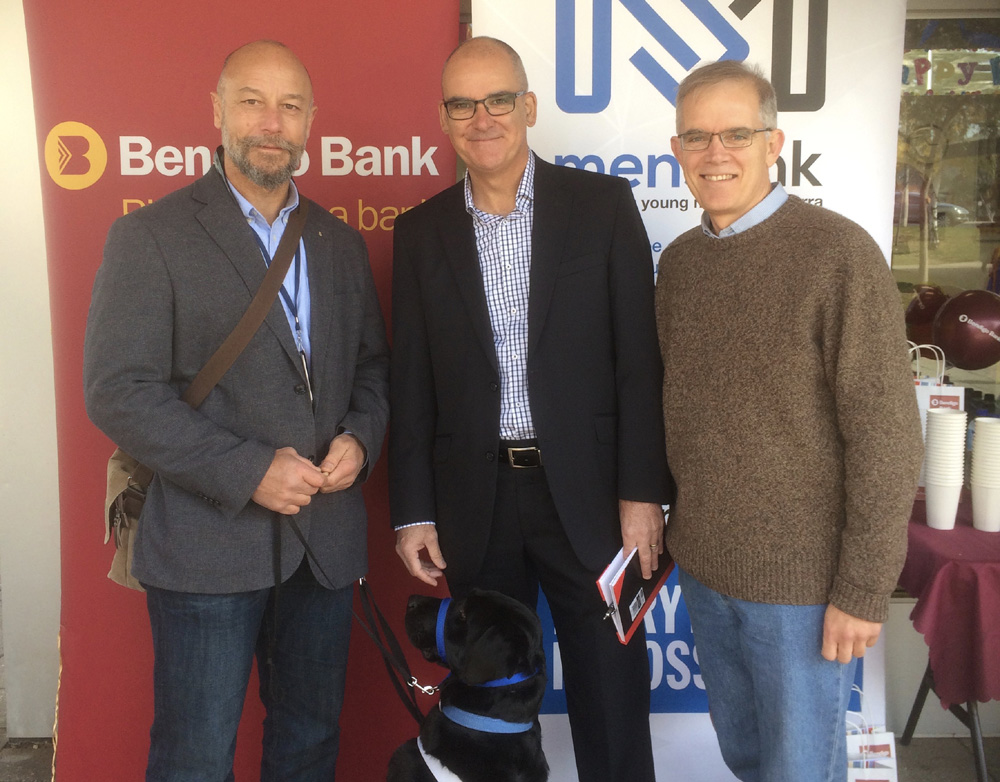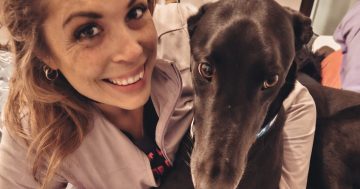
Post-traumatic stress disorder (PTSD) is a serious mental health condition that affects hundreds of thousands of men and women in Australia every year. It is generally the result of a person having been through an extremely stressful or traumatic event, leading to symptoms such as severe anxiety, depression, hyper-sensitivity, insomnia and emotional and social withdrawal.
It can happen to anyone, though veterans and first responders (paramedics, police officers and fire fighters) are particularly vulnerable. The statistics on PTSD are heartbreaking, with 3000-4000 Australian Defence Force personnel alone being diagnosed each year, and many more deaths by suicide than those killed in the line of duty.
Fortunately, there is a glimmer of hope. Research has found that sufferers of PTSD are 80% more likely to experience a reduction in symptoms when provided with a service dog.
Service dogs – similar to guide dogs and mobility-assistance dogs – have been specifically trained to provide affection and comfort to those who need it most. Often used in retirement homes, hospices and mental health clinics, service dogs are formally certified which allows them to travel anywhere with their owner, including on public transport, in shopping centres and so on.

But the cost is high. The best service dogs are often purebred Labradors, which after extensive training can fetch a price tag anywhere between $20,000 and $80,000. There have been stories of PTSD sufferers trying to take out personal loans to buy a service dog, which can lead to greater stress and hardship.
On a mission to change this is new not-for-profit organisation, Integra Service Dogs Australia (ISDA). ISDA was founded last year to support Ex-Serviceman’s Organisations (ESO) such as Soldier On, and is dedicated to providing veterans and first responders who have been diagnosed with PTSD with a free service dog.
“The dog is a gift for life,” says Ben Johnson, CEO and co-founder of ISDA. “We only work with Labradors because of their public acceptance as a support dog, combined with their nature and ability, ease of training, and natural focus on the handler.
“We have relationships with a number of pedigree breeders including Border Force and Guide Dogs Australia, plus select local breeders. Ideally the puppy is 20-24 months old when paired with a candidate, which involves assessing the nature and gender of the dog against the needs, lifestyle, living arrangements and pet experience of the candidate.”
Once the puppy and new owner are introduced, they are given an initial socialisation period to see if they bond. If they do, the dog is theirs to keep forever.
However, the real benefit of ISDA’s work comes after puppy placement.
“At that point, the puppies have not received official accreditation as a service dog, and the owner does not have certification as a service dog handler. So, the two are asked to attend structured group training 2-3 times per week.
“It’s a deliberate integration activity, where a collection of veterans and first responders become part of a group where they can talk, share stories about their experiences with their dog, and work alongside each other towards the goal of certification. It helps them build a network and reduce isolation which is common with acute PTSD.”
The training is competency based (not time based), so the pair can attend training for as long as it takes to meet the requirements of the Public Access Test. Once they both receive certification, they can travel together anywhere.
Ben says that support for the program has been fantastic, and that donations and corporate partnerships are needed to be able to train and gift more dogs.
“Everyone who works for ISDA does so voluntarily, so every contribution goes 100% towards funding the program. We currently have 10 Labradors in training, and we’re hoping to be able to do many more this year.”
Earlier this month, ISDA received a $500 grant from Bendigo Bank in Curtin which will go directly towards getting a puppy to a veteran.

“I chose Bendigo Bank because of their strong community focus, and the money they put back into Canberra and local charities. In just setting up the account at the Curtin branch, the staff suggested that I nominate ISDA for a grant as part of their 5th birthday celebration. We won, and received $500, which has provided us with much-needed funds for the program.
“Cost should not be a barrier to veterans, but it is. We want to remove that barrier completely so they can start on the road to recovery.”
To learn more about the program, or to find out if you or a loved one are a suitable candidate, contact Ben via Integra Service Dogs Australia.
Enquiries regarding volunteering or sponsorship are also very welcome, as are financial donations which can be made on the Integra website (please note ISDA is still going through the process of becoming a registered charity, so for tax-deductible donations please donate through the Soldier On K9 program).
If you or someone you know is in need of crisis or suicide prevention support, call Lifeline on 13 11 14 or visit its website.
This is a sponsored article, though all opinions are the author’s own. For more information on paid content, see our sponsored content policy.













